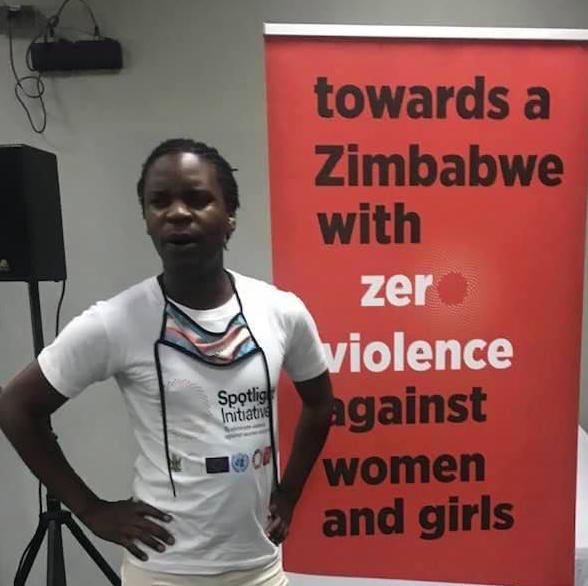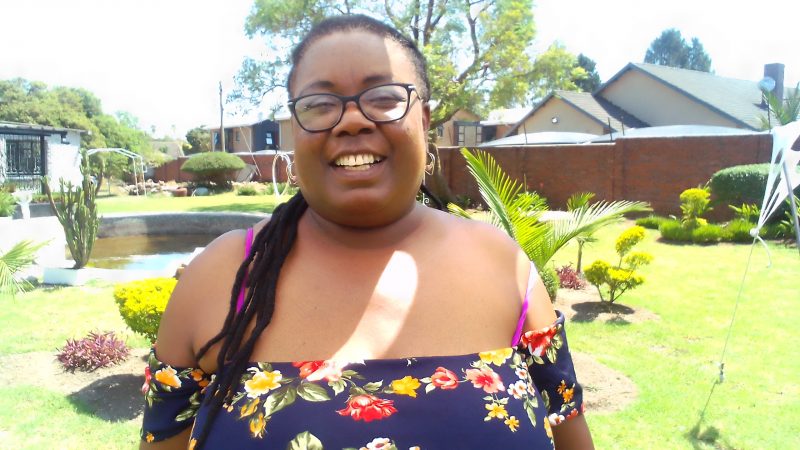|
Getting your Trinity Audio player ready...
|
By Muchaneta Chimuka
The fact that Zimbabwe has no provision for trans people to change their gender markers on their birth certificates leaves such people open to accusations of having same-sex relationships, which are illegal.
This reporter recently caught up with Queen Bee Chihera Meki (trans woman) who is the Program Director for the Trans and Intersex Rising Zimbabwe. Clad in her black slim-fit trousers, brown vest and an overlapping dress top black and white dotted colours, and a clean-shaven chin, she accepted my interview with glee.
Her head was neatly plated in a free-hand style. She has a melodious voice that resembles her way of transitioning from being male to female.

To many cultured Zimbabweans, this sounds ridiculous. However, in life, people do have choices and to some, it is inborn meaning to say one’s body might resemble the outward features of a man while the hormones inside tell the opposite which then creates a conflict of interest and confusion at the same time to the person and the communities at large.
Chihera says she doesn’t like her male organ and she feels trapped inside her body. That is why she opted to be called Q Bee Chihera to fulfill her desires as a woman and she is very particular about her feminine characteristics.
“At first, neighbours and family members were in a confusion. They failed to accept me because they regarded me as a man yet I am a woman and that’s how I feel like. Even when I am taking a bath, I don’t touch that thing (the male organ) because I hate it. At times I feel as if it could drop on its own or I cut it because I don’t like it. I would touch other organs like my head, face, buttocks, breast but that one no,” she said.
Queen Bee Chihera said she is going under a transition process that is migrating from being male to female which she said is a big process that starts from mind-boggling to mind healing as one chooses what he or she wants to be like, what to eat, dress and whom to associate with.
“This process cannot be easily understood by many. That is why some people think that we are a confused community yet we know what we will be doing. Some will be transitioning from female to male, while some are found in both classes that are male or female and some do not have any group and they choose to be called ‘them’. Some just like dressing as women or men and some do have mixed dressing among other things. So when our communities see a person whom they feel or think is a man dressed like a man they rush into a conclusion that he is gay or a lesbian yet some are not but it’s their choice of dressing,” she said.
She said, her organisation has a membership of over 3 500 people.
“What communities need to know is that there are some people who are born with two organs – the male and female and some doctors can hurriedly cut off one of the organs during birth before hormonal tests are conducted because they fear that the child will be a laughing stock when taken home in such a state. At the age of 12 that is the puberty stage, that’s when all the hormones start to show up and a child that is regarded to be female starts behaving like a male, and the operation would be irreversible. It’s good for a parent to wait until all the hormones fully develop and then doctors can do the rightful operation,” she said.
However, to some, it is a choice.
‘Of course, there are some who just choose to be male or female not because they want money from the organisations that they are affiliated to but what I know is that our communities have a lot of talent. Some do artworks and they can easily market their products locally and abroad. Some do painting and drawing exhibiting their talents in different areas of specialty and at the end of the day, they make money. Some do come to join our association thinking that there is a lot of donor funding. Truly speaking, hard work is required because there is nothing for free. We do work hard, day and night,” she added.
The community is also not spared from gender-based violence, HIV, and other sexually transmitted infections.
“Sexual abuse cases are also rife among trans-women communities as they are forced into sex by some female partners as a way of fixing them or to bring repentance in their minds. At the end of the day, we find several trans-women with children whom they are supposed to look after yet in their lifetime they had this choice of not having children. Chances of contracting sexually transmitted infections such as HIV, syphilis, and gonorrhoea among others are high. At times when we go to pubs, we are denied entry just because they might have suspected that we are gay or lesbian. At the point of entry the security guards would be instructed to take a white cloth and rub it on our faces and once they notice that you are male but you have face powder you can be denied entry,” she said.
She said some trans-women are sexually abused by several men of which most of them would be close relatives.
“Some transgender people have those features that resemble a woman yet in actual fact they would be male. Therefore, when they are sexually abused it would be very difficult for them to report such cases even to the police because they cannot be easily understood. Some children are sent away from home because of gay and lesbian accusation and we pick some from the streets and teach them life skills but the social construct will be always attacked because acceptance remains impossible due to the social and cultural beliefs,” she added.
She said under World Health Organisation they used to be referred to as mentally challenged people and in the United States, some were taken as ‘Weird or Freak people’ because they cannot be understood as they undergo the transition process.
“Some married women are deeply affected after learning that their husbands are gay so do women who are married to lesbian women. It brings trauma because we are cultured to believe in heterosexual relationships. Gays and lesbians are very visible because of the way they behave – dress, and voice projection hence the public can know someone before he or she comes out publicly. When transitioning, the male organ can be removed and moulded into a female organ so women can have a male organ constructed for them but when it comes to having children it cannot be possible,” she said.
She added that hormonal therapy can be performed such that the female or male genitalia can fully grow depending on their family tree or generation hence the body organs grow to the size of that of the generational flow.
“Hormonal therapy used to be conducted at Karanda Mission Hospital but following the death of its founder, we are not certain if such process is still happening. Surely it is hard to understand that someone can be trapped in the wrong body. However there are some who dress for the show and can sing imitating other prominent artistes such as Dolly Parton or the late Michael Jackson but they won’t be gay or lesbian but they just do that for the show,” she added.
Tatenda (21), not her real name, is a male figure who said was born with high female hormones and she also feels like a woman.
“My mother knows that I am female because I was born with a male and female organ and I haven’t been operated on yet despite the fact that they chose to dress me like a male. My breasts once developed at the age of 12 and they later disappeared. I feel trapped in the wrong body and I believe I am a ‘She’ although my national identity cards and educational certificates are written ‘as he’.”
However, her story is different from Talent’s (not his real name) who is privately taking hormones that she administers to herself such that he can have female organs and features such as breasts, boobs, and hips and to reduce her masculinity because she wants to be a woman despite being born male.
“The danger with the unavailability of gender-affirming health services in Zimbabwe is a lot of young trans people tend to self-medicate in secret because they don’t have better options such as seeing a public doctor or taking hormonal therapy in public hospitals. Some end up injecting themselves in the wrong way and sometimes they develop some injuries, a disability, and sometimes it’s fatal,” she said.
According to a 2016 study by Trans Research, Education & Training (TREAT) – Zimbabwe’s first trans-led organisation, there are approximately 400 openly trans people in the country.
Doctors, however, remain insensitive and ignorant of transgender issues and some of the services are obtained from abroad at exorbitant costs.
“Accessing public medical services for hormonal treatment is impossible, which is why trans-people administer hormones secretly despite the negative side effects,” he said.
“Personally, I am aware that taking testosterone, which is a strong substance, may lead to high blood pressure, blood clotting, heart conditions, liver, and kidney damage.”
Besides the health risks, paying for the drugs can be costly.
Transmart Director, Mrs. Gumisayi Bonzo, who leads a community-based organization that works with key populations and vulnerable groups in the country, says the state of abuse is rampant among the gays and lesbians and those born with both organs.
“The dilemma is big to those born with both organs because at the health institutions it’s the mother that chooses the organ that is supposed to be cut and the one that should remain with the child. That is grievous because the procedure is supposed to be done at the puberty stage when doctors are in a position to know the number of hormones that the child has. Because of our culture where male children are needed most, we find out that the female organ is removed and the children are left with a male organ yet they have more female hormones.
“This is the reason why we find some male children behaving like women. They like pink clothes, doing laundry, cooking, and playing with girls. The other reason is that the tests are expensive and are mostly done in South Africa hence other parents do not bother themselves to do the tests for their kids for a corrective surgery to be done and they end up living with the problem,” she said.
According to some who have taken the hormonal therapy the testosterone gel treatment therapy ranges between $200 and $400 a month, and regular testosterone injections cost more than $100 monthly if sourced privately while the oestrogen therapy in South Africa goes for R3,000 ($210).
Same-sex relations between men in Zimbabwe are illegal with specific laws criminalising sodomy as well as any contact between two men that “any reasonable person would consider indecent assault or aggravated indecent assault if it involves women”.
Because of the prohibitive laws on trans rights, there is no provision for trans people to change their gender marker on their birth certificates, leaving them open to accusations of having same-sex relationships but in some countries where it has been legalised they are offered the utmost protection with the benefits of the law.






